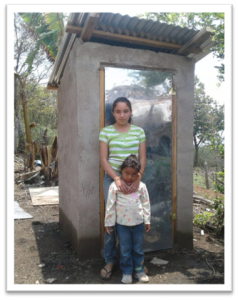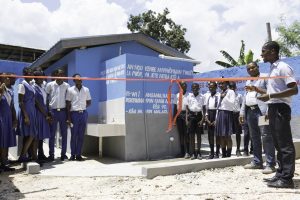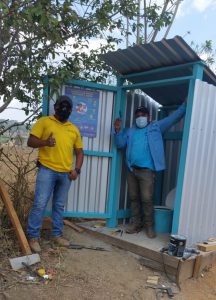 World Toilet Day, established in 2013, is a United Nations Observance that “celebrates toilets and raises awareness of the 4.2 billion people living without access to safely managed sanitation.” It focuses on taking action to tackle the global sanitation crisis and achieve sustainable development. This year’s focus is on sanitation and climate change.
World Toilet Day, established in 2013, is a United Nations Observance that “celebrates toilets and raises awareness of the 4.2 billion people living without access to safely managed sanitation.” It focuses on taking action to tackle the global sanitation crisis and achieve sustainable development. This year’s focus is on sanitation and climate change.
PWW works with rural and underserved communities across Honduras and Haiti in an effort to reduce the number of families living without access to safe sanitation. In Honduras, ensuring families have safely constructed, sustainable latrines is part of every program we implement. At schools, in both Haiti and Honduras, PWW constructs gender-specific latrines. This provides the best support of girls, ensuring they have the privacy and tools necessary to manage their menstrual cycles.
 At this time, PWW teams are unable to provide family latrines in Haiti due to government regulations on subsidizing home latrines. We are, however, able to provide education, which our team in Haiti will be doing on World Toilet Day, November 19th.
At this time, PWW teams are unable to provide family latrines in Haiti due to government regulations on subsidizing home latrines. We are, however, able to provide education, which our team in Haiti will be doing on World Toilet Day, November 19th.
The PWW Haiti training team has organized a World Toilet Day workshop, in the community of Mirebalais, focused on the theme: “What is the link between a latrine/toilet and climate change?”
PWW will lead a workshop focused on how climate change threatens water, sanitation and hygiene infrastructure. PWW trainers will invite conversation to explore what happens when floodwaters contaminate wells used for drinking water and how floods damage toilets, causing human waste to spread through communities, even impacting food crops. Discussion will incorporate how human waste lives in environments and causes chronic and fatal diseases. An explanation of sustainable sanitation will be shared, including how it provides a reliable and efficient system for the safe collection, disposal, treatment and reuse of feces, which withstands external climate shocks such as floods, water shortages and increases in sea water levels.
Workshop participants will take part in a hands-on activity, constructing the different types of latrines with cardboard and presenting completed structures to the group.
As a result of this World Toilet Day sanitation awareness event, participants will be able to:
- List at least three (3) types of threats that can damage any part of a sanitation systems, including toilets, pipes, tanks and treatment plants.
- Understand the importance of building a latrine and/or toilet (including proper maintenance), and how a latrine/toilet helps to protect human and environmental health.
- Understand sustainable sanitation, as well as clean water and hand washing facilities, to protect human health and stop the spread of deadly infectious diseases, including COVID-19, cholera and typhoid.
 World Toilet Day events in Honduras have been thwarted because of the two unprecedented, late-season hurricanes that struck the communities where PWW teams live and work. These extreme, late-season storms have been attributed to climate change. PWW teams have had to shift to emergency response.
World Toilet Day events in Honduras have been thwarted because of the two unprecedented, late-season hurricanes that struck the communities where PWW teams live and work. These extreme, late-season storms have been attributed to climate change. PWW teams have had to shift to emergency response.
With hundreds who have lost homes, the situation with sanitation and hygiene is critical. Hurricane shelters in Trojes are overcapacity. Latrines at these shelters have been pushed beyond capacity. Children and adults are left with no option but to practice open defecation. Local authorities are extremely concerned about the significant potential of spreading diseases.
PWW has been asked to help by providing emergency handwashing stations, latrines (like the one pictured here), and a shower, as well as to provide emergency water filters. We’ve set up an emergency fundraising effort, if you feel moved to help these families who have lost so much, once again gain critical access to safe water, sanitation and hygiene. Learn more here.
